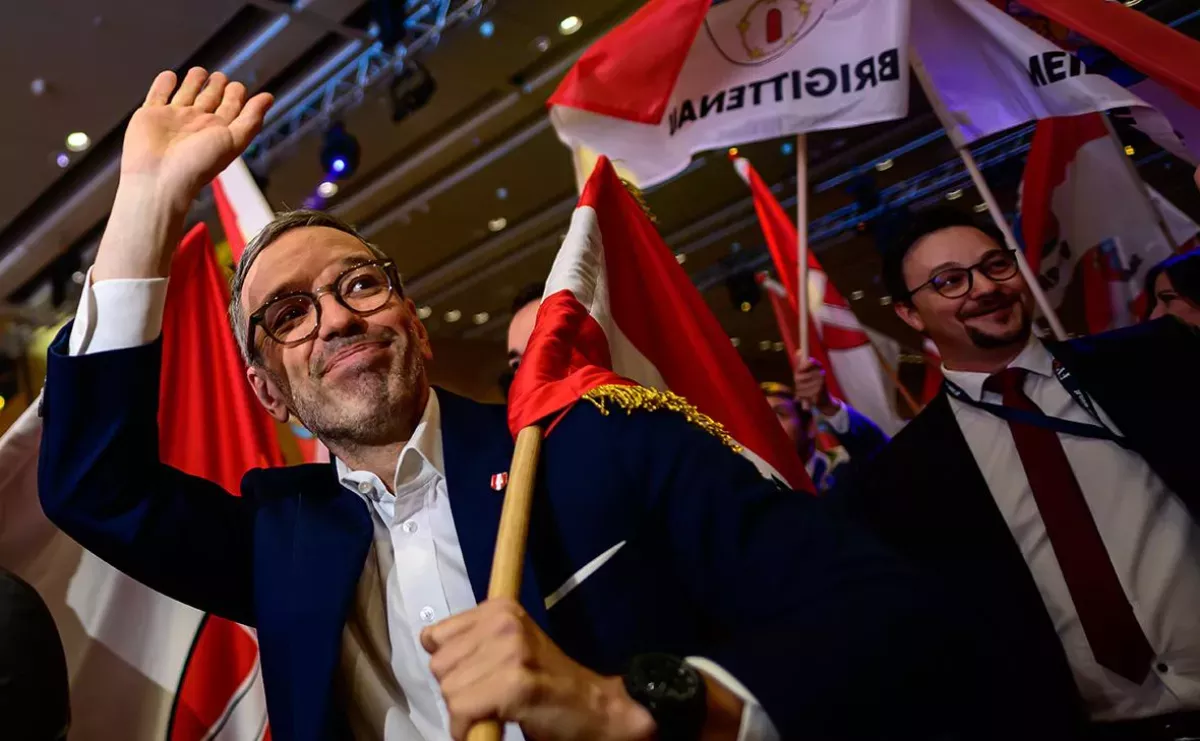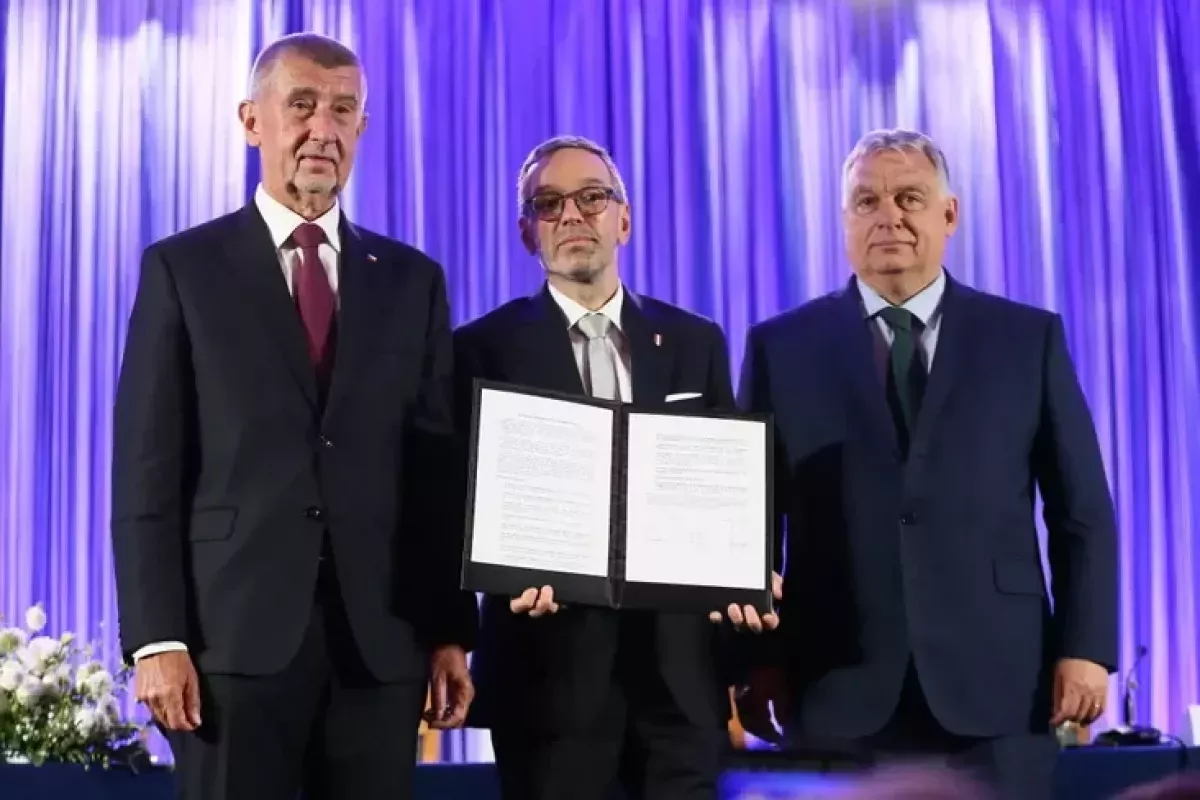Austria shifts to right Europe Divides Along Party Lines
Recently, Austria joined the ranks of European countries where right-wing parties have celebrated electoral victories, marking the first time in the nation's history. Austria's Freedom Party (FPÖ), led by Herbert Kickl, garnered over 29% of the votes, with voter turnout reaching nearly 75%. Notably, this represents a 13% increase in support for the FPÖ compared to the previous parliamentary elections, translating to 58 out of 183 parliamentary seats.
Kickl stated that supporters of his party had "written a part of history" and immediately expressed readiness to collaborate with all political forces. However, most analysts are sceptical about the possibility of coalition-building between Austria's Freedom Party (FPÖ) and other parties. For instance, the current Chancellor and leader of the Austrian People's Party (ÖVP), Karl Nehammer, who has already acknowledged his defeat, preemptively dismissed this option. Some experts note that Nehammer's reluctance to work directly with Kickl suggests slim chances for a pragmatic alliance with the FPÖ. Notably, the ÖVP and FPÖ have previously formed a government together in 2000 and 2017.
On the other hand, Austrian President Alexander Van der Bellen announced early in the election campaign that he would not appoint Kickl as Chancellor if his party were to win (according to Austrian law, the head of state appoints the Chancellor).
In light of the evolving situation in Austria, many experts emphasize that while those opposed to the "rise of the right" (if not a full resurgence) in Europe find comfort in the challenges facing the Austrian Freedom Party (FPÖ) in forming coalitions, the underlying issues are much more profound. Right-wing parties are steadily gaining traction across Europe, which has become increasingly apparent, especially after the significant outcomes of the June elections for the European Parliament. Notable successes were achieved by Germany’s Alternative for Germany (AfD), Marine Le Pen’s National Rally in France, and right-wing parties from Austria, Italy, and the Netherlands.
Currently, the AfD has seen a rise in voter support in regional elections, particularly in eastern Germany. The programmatic positions of the FPÖ closely align with those of the AfD, particularly regarding military support for Ukraine. The FPÖ's manifesto calls for an end to contributions to the EU Peace Fund, advocating instead for the use of those funds to bolster the national army. Additionally, both parties share similar stances on anti-Russian sanctions and immigration issues.

For example, shortly before the recent elections, Kickl outlined his plans for building a "Fortress Austria," closed off to refugees and migrants, with provisions for deporting even those who have obtained Austrian citizenship but "failed to assimilate."
Meanwhile, opponents of the FPÖ held an unauthorized rally in the wake of the elections, calling to prevent the victors from forming a coalition. According to experts, even if the FPÖ fails to form a government and the defeated Nehammer remains Chancellor through political manoeuvring, the post-election landscape in Austria still marks the beginning of the end for those who remain in power.
Undoubtedly, this shift reflects a broader trend across Europe. At present, right-wing parties in various countries still lack the votes necessary to form governments without relying on other parties. However, the right-wing movement has gained such deep traction across the continent that even German Chancellor Olaf Scholz is openly using AfD slogans. This development may soon become a reality for official Vienna as well.
The question remains: how willing is the European Union to openly acknowledge the rightward shift of Europe when they continue to label right-wing parties as "ultra," "extreme," or "populist"? A clear example of the EU leadership’s reluctance to accept this right-wing reality is the list of candidates for key positions in the European Commission (EC) presented by EC President Ursula von der Leyen. With the exception of Raffaele Fitto from the Brothers of Italy party, there are no right-wing figures on the list. And even in Fitto's case, it’s apparent that excluding him would have triggered an open conflict between the EC and Italian Prime Minister Giorgia Meloni, who heads the Brothers of Italy and has long lobbied for Fitto’s candidacy. While he was appointed to a different role than Rome had hoped for, his inclusion seems more like a concession to avoid a clash.
EU leaders simply do not want to accept the undeniable fact that Europe’s shift to the right is transforming the entire political landscape of the continent. Despite the many obstacles right-wing parties faced, whether in European Parliament elections or national campaigns, they have nevertheless achieved historic success on all fronts.
Of course, in the case of the FPÖ (similar to the AfD in Germany), the ideological attacks are expected to intensify. Kickl’s use of the term "re-emigration" will come under sharp criticism everywhere (after their victory in the European Parliament elections, the FPÖ even lobbied for the creation of a new EU Commissioner for "re-emigration"). His portrayal of himself as the "people's chancellor" will also face harsh scrutiny, as it evokes troubling associations with figures like Hitler for many observers.
Notably, one of the first to congratulate Kickl on his victory was Hungarian Prime Minister Viktor Orbán, who called it a "historic" success. This brings to mind that after the European Parliament elections, Kickl, in alliance with Orbán and former Czech Prime Minister Andrej Babiš (now leader of the opposition), announced the formation of the "Patriots for Europe" coalition, which has since become the largest opposition faction in the European Parliament.

Meanwhile, across Europe, the pushback against right-wing parties is gaining momentum. In Germany’s Bundestag, a petition is circulating to request the Federal Constitutional Court to ban the AfD. Simultaneously, a Paris court has begun hearings on a case accusing Marine Le Pen’s National Rally of "money laundering through the fictitious employment of European Parliament staff."
As some political analysts suggest, the results of Austria’s parliamentary elections could deepen the divide in Europe along party lines. They argue that EU leaders seem to be living in a "parallel" world, where life carries on peacefully and orderly, without acknowledging the growing shifts outside their windows. The fact that Europe’s political "landscape" is changing seems to leave them unfazed. However, as some point out, if this trend continues, they will eventually be "affected" by this new political reality.
The resolution remains to be seen...








